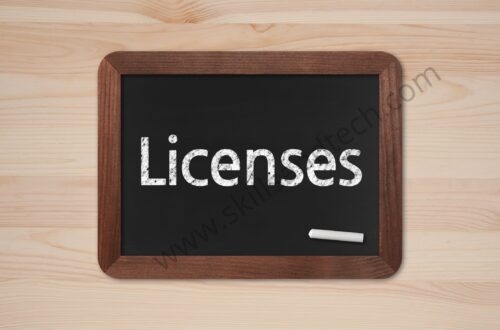What Is a DBA | SkillsAndTech
When it comes to business regulations, “DBA” stands for “doing business as.” Simply put, it’s a name registered for a company to do business under that is not its legal business name.
For example, you may have an LLC called “Smith Enterprises”, but your currently doing business as “Smith’s T-Shirts”. A DBA name is also sometimes called a fictitious name or a trade name.
See Also: How to Start an Eyelash Extension Business
To be clear, a DBA is not a business structure and has no impact on taxes. It’s simply a registered name for the business. If you have a sole proprietorship or a partnership, you must operate under your personal name unless you register a DBA.
Table of Contents
DBA vs. LLC
Entrepreneurs sometimes think a DBA is a business structure like an LLC. But this is not the case. If you only have a DBA name registered for your company, you are a sole proprietorship with a DBA name.
Forming an LLC requires filing certain forms with the state to create a legal entity for your business. It’s more expensive and time consuming to form an LLC, but with an LLC you have personal liability protection. You can also choose how you’d like your company to be taxed, such as a sole proprietorship or a corporation.
See Also: How to Start a Meal Prep Business
Do you Need a DBA?
A DBA is not required for any type of business. It is required, however, if you want to operate under a name that is not your official LLC or corporation name.
To simplify, there are two scenarios in which you would want a DBA:
- You are a sole proprietorship or partnership and you want to operate under a name that is not your personal name. Remember, however, that you do not have personal liability protection without forming an LLC, and your business is taxed at your personal income tax rate.
- You have a legal business entity like an LLC, and you want to operate under a different name to rebrand your company or diversify into new products or services.
See Also: How to Start a Coffee Roasting Business
Benefits of a DBA
Many companies choose to use a DBA because it provides benefits to the business.
1. You can choose any name and build your brand
Most DBAs are filed by sole proprietorships so that the owner can do business under a name that is not her own, and build a brand with a name that is associated with what the business offers. LLCs often choose DBAs to help brand all of their product lines. For instance, “Smith Enterprises LLC” might have multiple DBAs, including “Smith’s T-Shirts” and “Smith’s Shoes”.
2. Your bank accounts can have your business name
See Also: How to Start a Recycling Business
If you’re a sole proprietorship with a registered DBA name, customers can make payments to your business name, rather than your personal name.
This has two benefits: 1) You have more credibility with customers if they are paying your business and not you. It makes you seem more like an established business, and 2) You can keep your personal and business finances separate for accounting purposes. Keep in mind, you will also need an employer identification number (EIN) to open a business bank account.
3. Keep your name private
See Also: How to Find Your EIN Number
If you operate under your personal name, you are the business and your name is everywhere. With a DBA you can keep your name behind the scenes.
4. You can scale your business
You can have DBAs for any business that you want to operate under your legal business entity, so you can grow and diversify with names that identify each part of your business.
What a DBA Does Not Do
1. Not a business structure
See Also: How to Start a Florist Business
A DBA, again, is not a business structure that determines tax procedures. It provides none of the benefits and protections of an LLC or corporation.
2. Doesn’t protect your brand name
A DBA does not protect your name from being used by other companies. If you have a legal entity such as an LLC, no one else in your state can use your LLC name. The only way to protect your name throughout the country, however, is to trademark your name.
How to File a DBA Name
See Also: How to Start a Wheel Alignment Business
Filing requirements for a DBA vary by state, county, and city, and also by business structure. Check with government offices in your area to find out what and where you need to file. Fees generally do not exceed $100. You can most often file to register your name online.
In some states, you may have to place an ad in a local newspaper to announce your intention to use the name, and run the ad for a certain period of time. This is to fulfill public notice requirements in those states.
You can do searches in your area to make sure the name you’ve chosen isn’t already being used. Your state’s website is a good place to start.
See Also: How to Start a Car Dealership
If you are a sole proprietorship or partnership, you can’t use “LLC”, “Inc.”, or “Incorporated” in your business name, as this gives the impression that you have established a legal entity.
If you are a sole proprietorship and operate under a name that is not your name and that you have not registered, you can face significant fines. The same is true for an LLC operating under an unregistered name.
In some states, you may have to renew your name registration periodically, so make sure that you stay on top of the time frames so that you are operating legally.
Your Name Is Your Brand
See Also: How to Start a Lawn Care Business
Your name will define your brand, so regardless of your business type, you need a name that says clearly what you do and who you are as a company. It is the first impression customers will have of your business, and it needs to convey your message and be memorable.
When you have an established name, it has value, so you need to make sure that you follow the requirements of the law and take steps to protect it. If you want to grow your business and sell in other locations, consider taking the protections to the next level and trademark the name.
In Conclusion
See Also: How to Start a Rental Property Business
DBAs have many benefits, and they are simple and inexpensive to file. If you are a sole proprietor, it will give your business its own identity and help you to build a brand. If you have an LLC, DBA names can help you expand your business into new product lines.
Regardless of your reasons for choosing a DBA, just follow the rules, choose your name wisely, and take steps to protect it. Then grow your business and make your name a household word!



